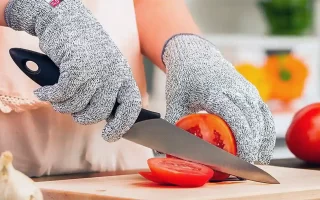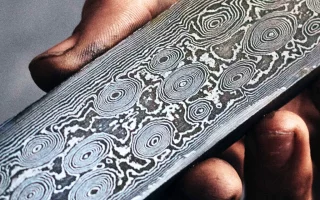When Must A Knife Be Cleaned and Sanitized: As knife is one of the most essential and important tools in the kitchen that helps to prepare food. If the knife blades are not cleaned and sanitized properly they may spread infection. A dirty knife may carry different types of micro organisms that are capable of producing bacteria. Even though 99% of virus and bacteria are spoiled in the cooking temperature, but you can’t neglect that one percent. The small amount can be enough to lead someone to hospital.
There are some specific times when to clean and sanitize your knife. We mentioned them bellow:
1. Before and After Cutting Raw Meat
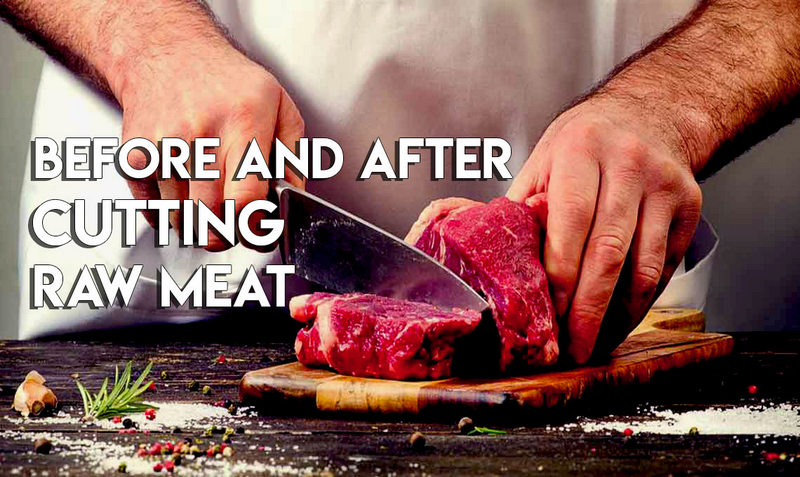
Raw meat can carry the most amount of contamination. Unlike the other food items, raw meat contain a lot of micro organisms in it. If you put a piece of meat somewhere without preserving materials, it will produce a huge amount of bacteria. The process is faster than any other food particle.
So before cutting raw meat, clean the blade with nice warm soapy water. Also repeat this process after finishing the cutting job. This will make sure, there are no germ left in the blade for spreading any sort of contamination.
2. Before and After Cutting Fruits and Vegetables
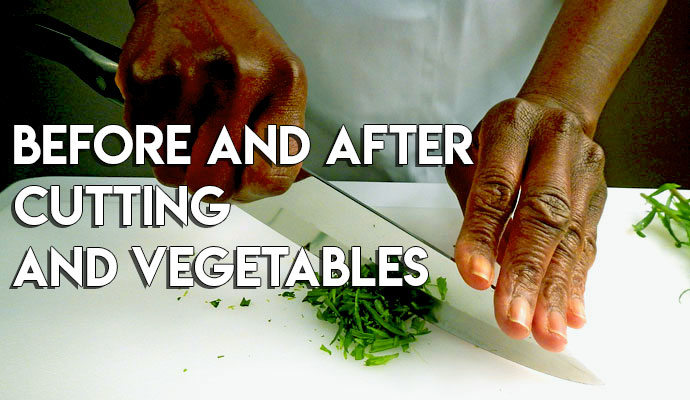
Even though vegetables and fruits are not a matter of concern compared to raw meat. but still you need to follow the hygiene. After slicing vegetables and fruits, wash the blade with plain water. That will be enough. However, there are some vegetables that are more likely get rotten fast. Onion buckles produces maggot very fast. If you slice onion with your knife and keep it that way, unwashed. Be prepared to see a lot of maggot is crawling all over the knife blade. So clean every time you finish slicing fruits and vegetables.
3. Before and After Scaling Fish
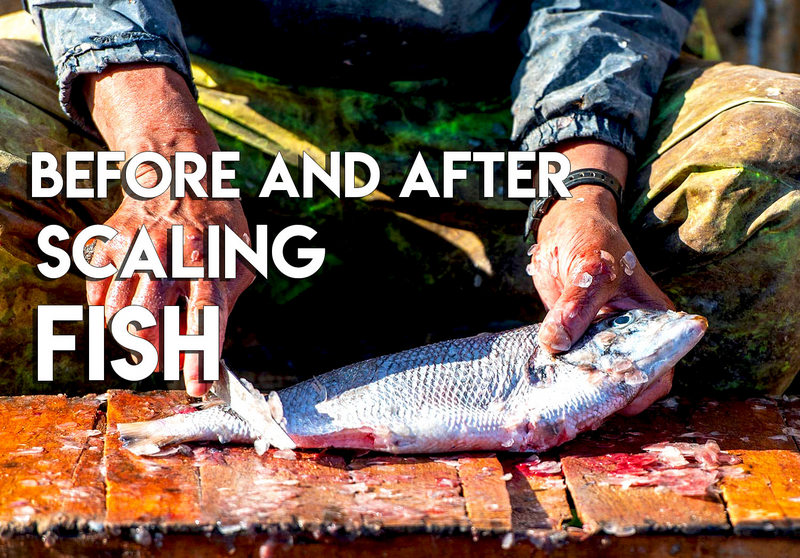
The most important part, every people forgets is that, they don’t consider it to be important to clean the knife after scaling fish. Well, it’s not something like cutting or slicing, but still the uncooked fish contain a lot of bacteria and micro organisms that may lead to serious health issue if consumed. More over, the fish scale contain some element that helps them to stuck with anything. You might have noticed the scales get stuck to your kitchen floor and it takes much time and effort to remove it. The scales may leave some permanent spot on your knife blade if it is not cleaned and washed properly right after scaling the fishes.
How Frequently Should You Clean Your Knives?
The answer differs. It depends on the way you use the knife. If you use the knife on a daily basis, I will recommend you to wash the knife each time you start using it and after you finish cutting with it. If you cut raw meat frequently than the knife requires more care than the ordinary knives. You need to clean it with hot water and wipe it with a piece of cloth every time you use it and finish cutting. Because meat spread more contamination than vegetables. If you are vegetarian and your knife is free from cutting any kind of animal protein, there is nothing to worry about. Even though you are not required to clean it other than using it, but I will recommend you to keep it in a dry and cold place. Wet and humid weather is quite bad for a metal blade which can lead the blade into rusty condition.
How to Clean and Sanitize a Knife?
First of all, there are lots of washing techniques depending on the purpose that are the knives used for. If you use the knife for cutting meat, You need to use soapy warm water to clean the blade. Don’t forget to wear rubber gloves, or you might cut yourself. Gently put your knife into soapy warm water and rub the blade with your hand. Make sure there are no existing food particles. You also have to use detergent. Remember, there are a lot of detergent types on the market. Some of them are very harmful for your knife blades and even for your skin. Make sure you purchase the best one. To keep your knife free from bacteria and pathogen don’t forget to wash the blade and the handle with hot water. The raw meat contains a lot of micro organisms. Follow the above instructions to clean the knife blade properly. Most of the knife blades are made of stainless steel. But the carbon steels are more likely to get affected by corrosion. So always try to purchase a knife with a stainless steel blade.
Things To Consider While Washing
There are a lot of things that should be kept in mind when it comes to cleaning and sanitizing a knife.
- The first thing is, you should always use rubber gloves to protect your hand, Unless you might cut yourself severely. Secondly. cleaning detergents contain elements that is harmful to the skin sometimes. A pair of rubber gloves will protect your skin from the harmful affect of the detergent.
- You should choose proper detergent to clean the blades, sometimes the detergents are not right for your knife blade. A wrong selection might result a rusty or damaged blade
- Identify either your knife blade is made of stainless steel or carbon steel. Stainless steel are more likely stronger when the carbon steel are vulnerable by rust. If you have carbon steel blade, don’t forget to dry it up after washing.
- Don’t wash the knife is the dishwasher. This might get some friction between the dishes and the knife blade which may result scratches in the blade.
- Dry well. After finishing the cleaning job, don’t forget to dry the blade well. Or it might end up developing rust in the long run.
Importance of Cleaning and Sanitizing Knives
There are a lot of points that we can bring in front of you regarding the importance of cleaning and sanitizing the knives. Knife is one of the most important tools that we need in case of preparing our food. A poisonous or dirty knife can lead anyone to hospital. Sometime the infection by a dirty knife is so fatal that people may die. So cleaning knife blade is the most important rule to handle this situation.
Also, if you don’t clean knives properly, it may transfer viruses and bacteria from one food to another. which may result cross contamination, able to procreate a dangerous health issue. You might think there are safe zones like cooking temperature. But the temperature is not going to help you all the time. You don’t cook the fruits, do you?
Conclusion
If you don’t want to purchase a new knife in every month. It will be best for you to take a good care of it. You might also like to have a costly knife and use it for a long time rather than purchasing cheap knives and changing them in few days. Clean and sanitize your knife often. It won’t cost you much time, yet it will ensure a good health to your knife. Follow these steps, it will guarantee a shinny metal knife blade with a great hygiene. Moreover, you don’t have to worry about spending some extra bill for the hospital by having a poisonous meal prepared by a dirty knife. You can also follow the same rules for your pocket knives. The rules work for all blades that are made of metals. And blades are always made of metals.

Hi, my name is Taras Kulakov and I’m a knife enthusiast. I have been collecting knives for over 30 years and I’ve owned literally thousands of different models over that time. My goal with this site is to share some of what I’ve learned about knives. You can find more info about Taras Kulakov here.



